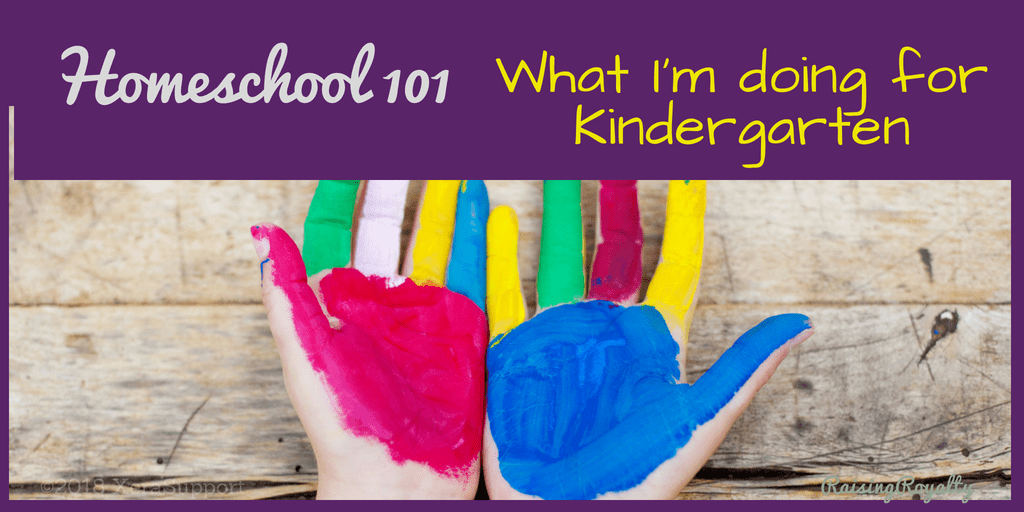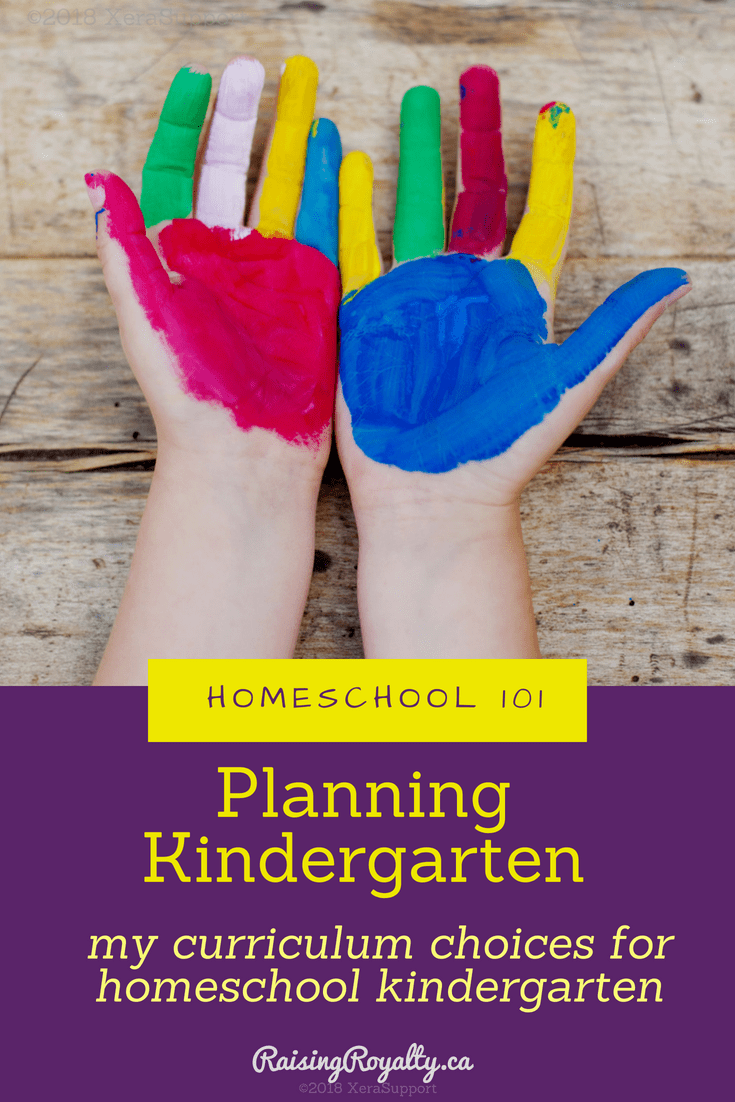
Homeschooling kindergarten is controversial. There are many homeschool veterans who urge new homeschoolers to wait. There are others who will say to start early. But for most of us, we start in kindergarten because our kids are ready.
This year, I have a 5 year old, who will be doing a 2nd year of Kindergarten. She needs the extra time to mature and really cement the foundational skills for learning.
What are the foundational skills?
For me, I focus on literacy, fine motor skills and basic numeracy concepts. In other words, the 3 R’s — reading, ‘riting and ‘rithmetic. So this means that we’ll concentrate on learning letters and sounds, practicing sight words and story building, and do lots and lots of counting, patterns and shapes.
Because this is our 2nd year of kindergarten, I’m also adding in some beginning science and social studies, along with art and music. We’re going to do a quick overview of space, air, weather and water, parts of a plant, animal and insect life cycles, and animal babies and habitats. Plus, we’ll do some paper crafts and coloring, to really strengthen those fine motor muscles and skills.
What curriculum am I using?
We’re eclectic learners, so I try for a multi-media based approach. But we do worksheets and textbooks along with our videos, songs, computer games and flashcards. Here’s what I’m using this year:
Language Arts:
Since one of the primary goals for my kindergartener is to have her either reading or close to it, we’ll do a lot of phonics. Plus we’ll do printing and reading too.
Phonics:
One of my favorite tools for teaching phonics and reading rules is the LeapFrog phonics video series Letter Factory, Talking Words Factory, Word Caper and Storybook Factory. This series of 4 videos are bright, engaging and memorable. They have really cute stories to go along with the concepts, and the songs are catchy without getting super annoying. I was fortunate enough to find copies of the DVDs at a thrift store, but you can get them at Amazon.
My 2nd favorite tool is the free workbook series FunFonix. This is a series of 6 workbooks that have repetitive activities for all the basic phonics rules. They’re in black and white, making them ideal for kids who have short attention spans or get distracted by the pictures. Plus, on the website, they have worksheet generators, so if your student needs extra practice, you can get the same images and activities.
Handwriting:
I love Handwriting Without Tears curriculum. Last year, I had her do “My First School Book” and this year we’re doing “Letters and Numbers for Me”. I’m also considering their new book “Kick start Kindergarten” as a backup, in case we finish earlier than I expect.
Reading:
This year, I’m starting my kindergartener with Pathway Readers. I picked up the entire series of readers at a curriculum sale, and a friend of mine raves about this series for reading practice. The workbooks that go with it are familiar looking — they look similar to Rod & Staff, another favorite of mine. And they’re cheap! I got new workbooks for about $3/book.
[convertkit form=5123319]
Math:
Kindergarten math, for me, is all about recognizing patterns. We do a lot of critical thinking concepts, working on counting skills, patterning, shapes and colors. So I am a huge fan of the Critical Thinking Company‘s books. Last year we did the Preschool Thinking Skills and Key Concepts book. This year, we’ll do the Kindergarten Thinking Skills and Key Concepts book, along with Mathematical Reasoning Level A.
Science:
We’re Christian homeschoolers, so I do prefer a Christian-based science curriculum. This year, I’m going to use Eagle’s Wings “Considering God’s Creation. While the publishers’ state their target age range is Gr 2-4, this program is fairly easy to adapt to younger ages. It doesn’t go in depth on any one topic, but moves along quickly to cover the main points in each topic, with tons of opportunity for hands-on exploration. And that makes it perfect, in my opinion, for wiggly kindergarteners.
There are two parts to this program: the teacher’s manual and the workbook. The teacher’s manual is quite scripted, but I don’t use it for the scripts. I simply skim out the info that I need to help my students complete the activities. We’ll read simpler books together for background info.
As a bonus, there is a CD (or you can get a digital version) with Creation-based songs on it. Some of them are cheesy, but some are very well done and enjoyable. They also help cement some of the concepts down.
Social Studies:
I am growing more and more fond of Rod & Staff material the more I use it and the longer I use it. For kindergarten, I really appreciate their A-B-C and G-H-I series. Rod & Staff refers to it as “preschool”, but it really is a 4-5 year old skill level. The first series, the A-B-C, series, we did last year, as it focused more on letters and numbers concepts. But this year we’re doing the 2nd half. The G-H-I series focuses on a different area of the world, and explores habitats and cultures while offering students cut-and-paste, matching and sorting activities.
Art:
My girls love doing crafts. So in the early years, I get A Beka’s Art Projects books. Last year, we did Art Projects K4 and K5. This year, we’ll do Art Projects 1.
These paper-craft books are great. They need minimal prep and extra supplies, and all the instructions and supply lists are given. I’ll cut out pattern pieces and gather the supplies during my weekly prep. Then it’s pretty easy to set up and have my student do the activity independently. And that’s a huge plus when you’re a large family, with a toddler around.
Music:
This year, I’ve purchased music lesson books, and I have my keyboard (finally) set up. So it’s ready to start basic piano and theory lessons. I plan on assigning daily 10 minute practice sessions with a once-a-week 10 min lesson for my kindergartener. I expect she’ll play around on the keyboard and have a lot of fun, but I know she’ll pick up something about rhythm and reading music too. And it’ll lay a foundation for later music exploration.
Perk: we’ll get some one-on-one time too! I think I’m almost looking more forward to that than actually doing the music lessons.
So that’s our Kindergarten year.
It shouldn’t take more than 30 minutes daily for my little girl to complete her lessons. Then she’ll be free to play with toys and her little sister, and do all sorts of play-based learning. In kindergarten, I feel it’s more important to have minimal structured time, and much more free play and exploration time. But I do like having the structured time, as it’s easier for them to get in the habit of studying, working with paper and books, and taking their education seriously.
Plus, they often want to be just like their older siblings or friends! So why not take advantage of that?
Are you doing kindergarten this year? What curriculum or materials are you planning to use, if any?
Don’t forget to grab your free copy of my Skills and Topics for Kindergarten list.
[convertkit form=5123319]
Like this? Pin it!

